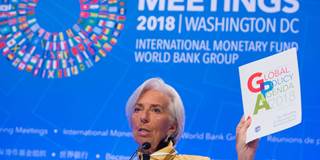The IMF is the body best suited to serve as a trusted adviser and an effective conductor of the global policy orchestra. If it is to fulfill that role, however, it must strengthen its credibility as a responsive and effective leader. That means listening to its members, then guiding them toward more harmonious policies.
SEATTLE – Imagine a world in which the annual meetings of the International Monetary Fund were more client-driven. Ahead of the gathering – this year’s will take place in Indonesia in October – the IMF would solicit from its 189 member countries three key policy issues on which to focus, not only in official discussions, but also in the numerous seminars that are held in parallel. The result would be an agenda that responded better to the continued anxiety that a growing number of policymakers – and populations – are feeling.

SEATTLE – Imagine a world in which the annual meetings of the International Monetary Fund were more client-driven. Ahead of the gathering – this year’s will take place in Indonesia in October – the IMF would solicit from its 189 member countries three key policy issues on which to focus, not only in official discussions, but also in the numerous seminars that are held in parallel. The result would be an agenda that responded better to the continued anxiety that a growing number of policymakers – and populations – are feeling.